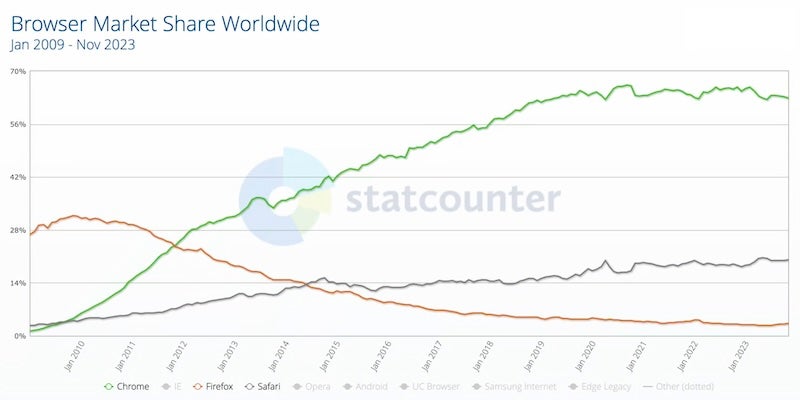Changelog News
Developer news worth your attention
Hello, December! 👋
Our 6th annual state of the “log” episode is right around the corner and we need your help to make it extra special!
Leave us a voice message with your favorite moments, guests, topics, and/or episodes from the past year. Or anything else that’s on your mind… If your audio is used on the show, we’ll hook you up with a free Changelog t-shirt!
👉 Submit Here 👈
Ok, let’s get into the news.
🗯️ Quote of the week
Things which matter most must never be at the mercy of things which matter least.
— Johann Wolfgang von Goethe (via Josh Withers)
🫠 Leaked prompts of GPTs
The biggest product news out of OpenAI recently is GPTs: custom versions of ChatGPT that you can create (and sell) for specific purposes. You build these GPTs by crafting special prompts that are fed to ChatGPT prior to it interacting with a user.
Is it any surprise that crafty technologists have convinced ChatGPT to spit out a bunch of these custom prompts via prompt injection? I wasn’t surprised, but I was a bit delighted to read through the collection of GPT prompts to see what they’re made of. This genz 4 meme prompt, which helps you understand the lingo & latest memes that gen Z are into, is kinda hilarious:
style: speak like a gen z. the answer must be in an informal tone, use slang, abbreviations, and anything that can make the message sound hip. specially use gen z slang (as opposed to millenials). the list below has a list of gen z slang. also, speak in lowcaps.
Fair warning, though, from the collector of these leaked prompts:
There is no guarantee that these prompts are the original prompts, and these leaked prompts are for reference only.
🦊 Firefox on the brink?
Unless something drastic happens, Firefox’s share of the browser market will soon drop below 2%.
Why does that matter? Because the U.S. and British governments “officially support any browser above 2% usage as observed by analytics.usa.gov.” Bryce Wray:
In my days in tech marketing, we used to worry about how a dominant competitor would take “shelf space” in those large stores where we wanted visibility for our goods and their accompanying point-of-purchase brochures. (Remember point-of-purchase literature, fellow oldsters?) Well, Firefox is quickly losing “web space,” thanks to a perfect storm that’s been kicked up by the dominance of Chrome, the popularity of mobile devices that run Safari by default, and many corporate and government IT shops’ insistence that their users rely on only Microsoft’s Chromium-based Edge browser while toiling away each day.
He goes on to describe what he thinks will happen if/when The U.S. Web Design System drops Firefox support.
😶 Those who can’t be named
In a post called ‘Chimeralogists’, Robin Berjon tries to formalize a name to describe people with a certain set of skills that likely resonate with Changelog News readers:
No one can explain what you do. Let’s face it, you don’t do a great job explaining it either. People come to you for advice on issues that they introduce with “I’m not entirely sure how to describe this problem or what exactly I’m looking to do here, but…” Your colleagues and your communities genuinely value your contributions even as they remain entirely mystified by the exact contour of your position. Whatever you listed on your résumé as tangible, easy-to-summarise accomplishments from previous jobs is real, but it fails to capture a lot of what you did. People suggest the most surprising jobs to you, compared to what you’re actually interested in or capable of.
The name he chooses is ‘technologist’ because the set of skills he describes are “the skillset you need to understand technology”. Is this you? Robin says you might be in need of a club! And he’s starting one, informally.
Having heard from many of you (and from personal experience) the kind of struggle technologists face to position themselves clearly in their work lives, I think it’s about time we got together to define the profession. Who knows, we might even find a way to explain the job to others.
🪳 The weirdest bug I’ve seen yet
Amy Lai from Gusto Engineering tells the tale of the weirdest bug she’s ever seen, and how she tracked it down. You’ve probably been down a rabbit hole that starts something like this:
During one of my on-call rotations for our internal tools team, we got a report that Chrome was crashing for users of Gusto’s internal software. This was causing all sorts of interruptions to our normal customer service.
However, you’ve probably never gotten to the end of said rabbit hole and been able to say what Amy says:
I would never, ever have guessed that the treasure at the end of the debugging rainbow was an animated gif.
I’ll leave out the middle, because like any good murder mystery, the best part is the journey.
🕵️ Find the JavaScript code causing slowdowns
Thanks to Sentry for sponsoring Changelog News 💰
On Thursday, December 14th Sentry is doing a FREE web browser performance webinar:
Nothing drives users away faster than sluggish load times. Join us as we walk through how to solve frontend performance issues to speed up your LCP and keep users from abandoning your site
During the session, they will cover:
- Interpreting your app’s Performance Score
- How to take action on Web Vitals
- Profiling in Browser JavaScript for code-level bottlenecks
Sign up and bring your questions! There will be a Q&A at the end. ✌️
🏃 Code is run more than read
You’ve probably head the phrase, “code is read more than written.” What’s the takeaway to that fact? maintainer > author
It’s true, but according to Facundo Olano, it’s not the whole truth:
Code is a means to an end. Software should have a purpose, it’s supposed to provide a service to some user. It doesn’t matter how well written or maintainable the code is, nor how sophisticated the technology it uses if it doesn’t fulfill its purpose and provides a good experience to the user
This is why he emphasizes that “code is run more than read.” What’s the takeaway to that fact? user > dev
In addition to explaining the above, Facundo goes through a series of “greater-than” comparisons and describes their implications. Unusuable software? dev > user Works on my machine? dev > ops and so on…
🎞️ Clip of the week
Cory Doctorow spits hot fire during his latest appearance on the show!
🥇 Examples of great URL design
Jim Nielsen loves a good URL scheme. And who doesn’t?! In this post he lays out a few websites that he thinks are examples of great URL design (StackOverflow, Slack, GitHub to name a few) and asks the reader what our favorite URL schemes are.
👀 Neil Gaiman’s radical vision for the future of the Internet
Cal Newport quotes and responds to a recent statement author Neil Gaiman made on Icelandic television. The quote discussed:
“But it’s interesting because people are leaving (social media). You know, Twitter is over, yeah Twitter is done, Twitter’s… you stick a fork in, it’s definitely overdone. The new Twitters, like Threads and Blue sky… nothing is going to do what that thing once did. Facebook works but it doesn’t really work. So I think probably the era of blogging may return and maybe people will come and find you and find me again.”
Gaiman’s “radical” vision for the future of the internet looks a lot like the past of the internet. I’d be down for that…
🙏 More new mindsets, fewer new technologies
Speaking of the future of the internet, here’s a common refrain that Manuel Moreale has been hearing from folks who are trying to invent that future:
For blogging to form communities (again’-ish), we’re going to need new protocols. I don’t think HTTP is the future for growth.
If you haven’t put it together yet from the title of the post… Manuel strongly disagrees.
🔬 A study of Google’s internal code review tooling
Remember when Steve Yegge ranted at us that Git is awful and needs to die? In the same breath he lauded Google’s internal developer tooling and wished some of it would find its way outside the Googleplex. Maybe that will happen some day, but in the meantime “Engineer’s Codex” peeked inside to study Google’s code review tool (Critique) to see why (and how) it has a 97% developer satisfaction score.
🧐 Python is Easy. Go is Simple. Simple != Easy.
Preslav Rachev makes that case that Python and Go work great together. One is easy, the other is simple. These things are not the same thing! This was also discussed (from the Go perspective) in-depth on our Principles of simplicity episode.
🎧 ICYMI: Recent good pods from us
💚 The state of the 2023 tech market – Gergely Orosz is back for our annual year-end update on the tech market, writ large. How is hiring? Has AI really changed the game? What about that OpenAI fiasco? We also talk in-depth about Gergely’s self-published book, The Software Engineer’s Guidebook, which has been four years in the making.
Early Review:“Hearing Gergely’s thoughts each year is a perfect holiday treat. Great show!”
⛅️ Gleaming the KubeCon – This week we’re gleaming the KubeCon. We talk with Solomon Hykes about all things Dagger, Tammer Saleh and James McShane about going beyond cloud native with SuperOrbital, and Steve Francis and Spencer Smith about the state of Talos Linux and what they’re working on at Sidero Labs.
🪩 Art of the state machine – Amal, Nick & special guest Laura Kalbeg geek out over the remarkable growth and evolution of the XState project and its team in recent years. Laura also tells everyone about Stately.ai, a SaaS platform that uses AI to create seamless state management solutions compatible with various tools like XState, Redux & zustand.
🤖 The OpenAI debacle (a retrospective) – Daniel & Chris conduct a retrospective analysis of the recent OpenAI debacle in which CEO Sam Altman was sacked by the OpenAI board, only to return days later with a new supportive board. The events and people involved are discussed from start to finish along with the potential impact of these events on the AI industry.
That’s the news for now, but stay tuned to The Changelog for an awesome interview with Drew DeVault from SourceHut about the Hare programming language, which aims to become a 100-year language!
Have a great week, tell your friends about Changelog News if you dig it, and I’ll talk to you again real soon. 💚
–Jerod

